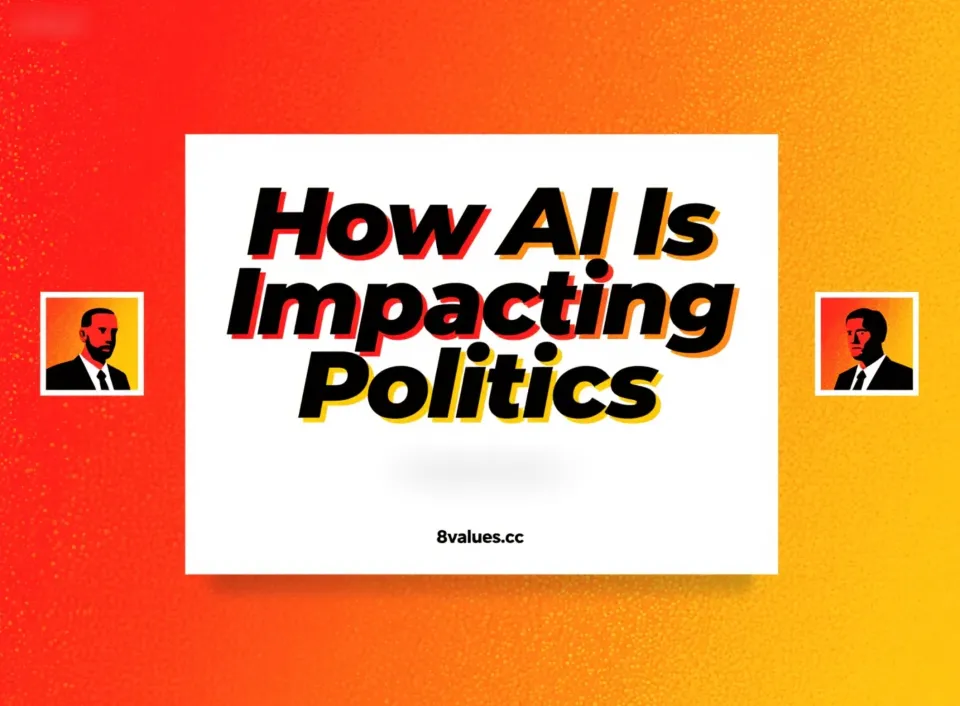Artificial Intelligence and Politics: How to Shape Future Democracy and Elections?
Explore how artificial intelligence can profoundly influence the global political landscape, from campaign strategies to government governance, to challenges facing election integrity. Understand the opportunities and risks brought by AI and its far-reaching implications for individual political participation and the future of democracy. Take a political leaning test now to understand your political stance. (Artificial intelligence, political ideology, political tendency, election integrity, democratic participation)
Artificial intelligence (AI) is reshaping every aspect of modern society at an alarming rate, and the political arena is no exception. It not only changed the way political campaigns operate and government communication models, but also profoundly influenced the ways citizens participate in the democratic process. From optimizing voter positioning to improving public service efficiency, AI has shown great potential. However, these opportunities also come with severe challenges such as data bias and dissemination of false information (deep falsification). Understanding the dual role of AI in politics is crucial for us to understand the future political direction.
How does AI revolutionize political campaigns and civic participation?
Artificial intelligence is bringing a revolution to political campaigns. Through powerful data analytics and automation capabilities, AI tools can help teams identify potential supporters more accurately. For example, by analyzing massive data sets, campaigns can customize information to align with specific population preferences and concerns, thereby improving the effectiveness of communication. AI systems can also predict voter behavior and preferences, allowing campaigns to allocate resources more effectively, focus on solving key issues or seek support from swing voters. In addition, AI also plays a role in content creation, such as the rapid generation of speeches or social media posts, greatly improving the production efficiency and scale of promotional materials.
More importantly, AI technology is also promoting the democratization of elections. Many ordinary citizens and independent candidates can now take advantage of easy-to-use AI tools to effectively run campaigns under limited budgets. This gives people from all walks of life the opportunity to participate in public services and challenge the inherent pattern of the traditional political system. AI can automate tasks such as advertising delivery and content creation, saving a lot of time and money, and giving independent candidates more energy to communicate face-to-face with voters, thereby deepening democratic participation.
AI improves government governance and public service efficiency
The integration of artificial intelligence is also improving the efficiency and transparency of government operations. For example, some governments have begun experimenting with using AI-generated digital spokespersons to simplify official information releases and make communication more efficient and accessible. In policy development, AI tools can support smarter decision-making by assisting legislators in analyzing large amounts of policy data, assisting in drafting bills, and even predicting the potential impact of proposed laws. In addition, AI-powered systems such as digital voting platforms are being explored in the field of digital governance to make civic engagement more inclusive, although this still faces challenges of accessibility and security.
Challenges and risks of election integrity brought by AI
Despite the many benefits of AI, it also poses significant risks to the democratic process. One of the most popular threats is the spread of false information and deepfake media. Content generated by AI, such as deep fake videos or phone recordings that mimic the voices of public figures, can mislead voters and seriously undermine trust in the election.
In addition, AI can also be used to create false grassroots movements, creating false public opinion illusions by generating false online accounts or content to exaggerate support for a candidate or policy. Election systems may also face AI-driven cyberattacks, which require enhanced cybersecurity measures to protect the integrity of the voting infrastructure.
AI in political roles: What’s the possibility of the future?
The concept of “Can AI replace human politicians?” is gradually attracting attention. Experimental attempts, such as chatbots in the campaign, highlight people's curiosity about the role of AI in governance. These initiatives suggest that AI has the potential to act as an impartial mediator, or even a decision-maker. The degree of public openness to AI participation in politics varies from region to region. For example, a 2021 survey showed that Europe has higher support for AI political roles than the United States, which has also triggered profound thoughts on the value of human beings in democratic participation. In the future, the concept of "algocracy" - i.e., algorithmic governance - is being discussed, which may both enhance or weaken democratic principles, depending on how they are implemented.
Ethics, privacy and regulatory urgency
The widespread use of AI in politics also brings a series of pressing ethical issues and regulatory challenges. AI systems may continue or even amplify unfairness due to bias in training data, leading to discriminatory positioning or decision-making targeting specific groups. In addition, AI’s use of voter portraits has also raised concerns about data privacy and personal information being monitored because campaigns collect and analyze large amounts of personal data.
Policymakers are working to explore how to effectively regulate AI without stifling innovation or freedom of political expression. Many countries and international organizations have begun to pay attention to these issues and have begun to develop relevant policy and legal frameworks.
Explore your political stance
In an era when artificial intelligence is increasingly permeating politics, understanding one's own political concepts has become unprecedentedly important. AI technology can be a powerful tool to promote democracy and improve governance efficiency, or it can be abused to spread false information and manipulate public opinion.
How do you view these changes? What is your political stance?
Through the political leaning test , you can gain a deeper understanding of your views on dimensions such as economic, diplomatic, civil liberties and society. This will not only help you better understand the current political issues, but will also allow you to make clearer judgments when facing the political changes brought by AI.
Join our 8Values free political orientation test now and explore your political values! You can also browse our blog to learn more about political ideology and current affairs analysis.






